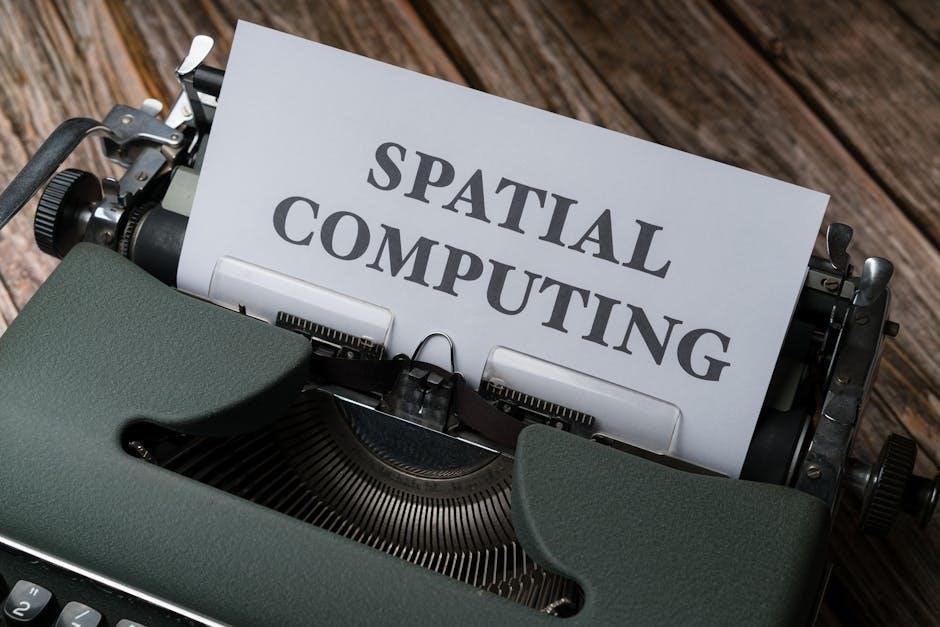This book by Vaclav Smil provides a comprehensive understanding of the world’s functioning, covering energy, food, and water systems. It offers insights into global challenges.
Smil’s work is praised for its depth and readability, making complex topics accessible. It serves as a foundation for addressing the world’s most pressing issues effectively.
1.1 Overview of the Book and Its Author
Vaclav Smil, a renowned scientist and author, explores the fundamental forces shaping our world in How the World Really Works. The book delves into energy, food, water, and waste, offering a holistic understanding of global systems. Smil’s expertise in environmental science and history provides unique insights, making complex topics accessible. His writing bridges the gap between technical knowledge and everyday relevance, appealing to both scholars and general readers. The PDF version of this essential guide is widely available for easy access.
1.2 Key Themes and Objectives
The book focuses on four key elements: energy, food production, water, and waste, which are essential for understanding modern civilization. Smil’s objective is to provide a comprehensive understanding of how these systems interconnect and impact global challenges. By exploring these themes, the book aims to empower readers with the knowledge needed to address pressing issues like climate change and sustainability. Smil’s goal is to bridge the gap between scientific complexity and everyday relevance, fostering a deeper appreciation of the world’s intricate workings.

The Four Key Elements of Understanding the World
The book identifies energy, food production, water, and waste as the core elements shaping global systems. These factors are essential for understanding modern civilization’s functionality and sustainability;
2.1 Energy: The Foundation of Modern Civilization
Energy is the backbone of modern civilization, driving technological progress, transportation, and industrial processes. Smil explores how energy transitions, from biomass to fossil fuels, have shaped societies and economies. He emphasizes the environmental consequences of energy consumption, highlighting the balance between energy demand and sustainability. Understanding energy systems is crucial for addressing climate change and developing future solutions, making it a cornerstone of global stability and development.
2.2 Food Production: Feeding a Growing Population
Food production is a critical pillar of human survival, requiring efficient systems to sustain a growing global population. Smil examines how agricultural advancements, from fertilizers to irrigation, have transformed food availability. However, he highlights challenges such as land degradation, water scarcity, and the environmental impact of intensive farming. Balancing productivity with sustainability is essential to ensure food security and mitigate the strain on natural resources, making it a central issue in global development and stability.
2.3 Water: The Most Precious Resource
Water is the most vital resource for life, yet its scarcity and unequal distribution pose significant challenges. Smil emphasizes the role of water in agriculture, industry, and daily life, highlighting the delicate balance between supply and demand. He explores the impacts of climate change and population growth on water availability, urging sustainable management to prevent global crises. Efficient use and conservation are crucial to ensure this resource remains accessible for future generations, making it a cornerstone of human and environmental well-being.
2.4 Waste: The Unseen Consequence of Progress
Waste management is a critical yet often overlooked aspect of modern life. Smil examines how industrialization and consumption patterns generate vast amounts of waste, impacting ecosystems and human health. He discusses the challenges of waste disposal, recycling, and its environmental consequences. Smil advocates for sustainable practices to reduce waste, emphasizing the need for a circular economy to mitigate its harmful effects and promote a healthier planet for future generations. Addressing waste is essential for global sustainability and resource efficiency.

Historical Context of Global Challenges
Smil’s book explores how historical events and scientific advancements have shaped modern global challenges, emphasizing lessons from the past to address contemporary issues effectively.
3.1 The Role of Science and Technology in Shaping Society
Vaclav Smil’s work highlights how science and technology have transformed society, driving progress in energy, agriculture, and urbanization. These advancements have enabled modern civilization but also introduced challenges like environmental degradation and resource depletion. Smil emphasizes the dual nature of technological growth, underscoring its potential to solve global issues while cautioning against unchecked development. Understanding this balance is crucial for sustainable innovation and societal well-being.
3.2 Lessons from the Past: Avoiding Repeated Mistakes
Understanding historical context is vital for avoiding past errors. Smil’s analysis reveals how societies have repeatedly faced challenges like resource depletion and environmental degradation. By studying these patterns, we can identify recurring mistakes, such as overexploitation of natural resources and inadequate planning for long-term sustainability. Learning from history enables us to develop strategies that mitigate these issues and foster a more resilient future. This retrospective approach is essential for addressing contemporary global challenges effectively.

The Interconnectedness of Modern Systems
Modern systems are deeply interconnected, linking energy, food, water, and waste. Understanding these interdependencies is crucial for addressing global challenges effectively.
4.1 Economic, Environmental, and Social Interdependencies
Economic systems rely on environmental resources, while social structures depend on economic stability. This interplay highlights the need for sustainable practices to ensure long-term prosperity and environmental health. Understanding these connections is vital for addressing global challenges effectively.
4.2 The Impact of Globalization on Local Systems
Globalization has profoundly shaped local systems, fostering economic interdependence and cultural exchange. However, it often leads to resource exploitation and cultural homogenization, affecting local communities. Smil emphasizes the need for balanced policies to mitigate negative impacts while harnessing globalization’s benefits for sustainable development.

Urbanization and Its Effects on the World
Urbanization drives innovation and economic growth but poses challenges like resource depletion and social inequality, requiring sustainable solutions to ensure equitable development worldwide.
5.1 The Rise of Cities and Their Role in Innovation
Cities have historically been hubs of innovation, fostering creativity and technological advancements. The concentration of diverse minds in urban areas accelerates the exchange of ideas, leading to breakthroughs in science, technology, and culture. Urban centers attract investment, talent, and resources, creating ecosystems that nurture entrepreneurship and progress. This dynamic environment has been instrumental in shaping modern civilization, making cities indispensable to global innovation and development.
5.2 Challenges of Urban Growth: Sustainability and Equity
Urban growth presents significant challenges, particularly in sustainability and equity. Rapid urbanization often leads to environmental strain, resource depletion, and social inequality. Ensuring sustainable development requires balancing economic growth with ecological preservation and social justice. Equity issues arise as urban expansion can marginalize vulnerable populations, exacerbating disparities in access to resources, housing, and opportunities. Addressing these challenges demands integrated policies that prioritize inclusivity and environmental stewardship to create livable and equitable cities for all residents.

The Role of Technology in Shaping the Future
Technology is a driving force behind global progress, offering solutions to complex challenges. However, its dual-edged nature demands careful consideration of ethical implications and societal impacts.
6.1 Technological Advancements and Their Dual-Edged Nature
Technological advancements bring immense benefits, such as improved efficiency and innovation, but they also pose significant challenges. While technologies like renewable energy and AI offer solutions to global issues, they can also exacerbate inequalities and ethical dilemmas. For instance, automation may boost productivity but displaces jobs, raising concerns about labor and equity. Balancing progress with ethical considerations is crucial to ensure technology serves humanity responsibly and sustainably.
6.2 Ethical Considerations in Technological Development

Ethical considerations are paramount in technological development to prevent misuse and harm. Issues like data privacy, algorithmic bias, and environmental impact require scrutiny. As technologies advance, ensuring transparency, accountability, and inclusivity becomes critical. Addressing these ethical dimensions helps align innovation with societal values, fostering trust and equitable outcomes. Without ethical frameworks, technological progress risks perpetuating inequalities and undermining its potential to benefit humanity collectively.

Applying Knowledge to Solve Global Challenges
Applying knowledge effectively addresses global challenges like climate change and resource scarcity. Education and critical thinking empower individuals to develop sustainable solutions for a better future.

7.1 Strategies for Addressing Climate Change
Addressing climate change requires a multidisciplinary approach, including transitioning to renewable energy, enhancing energy efficiency, and implementing carbon capture technologies. Reducing greenhouse gas emissions through sustainable practices in agriculture and industry is crucial. Global cooperation, education, and policy changes are essential to ensure equitable solutions. Investing in clean technologies and fostering innovation will drive long-term progress. Individual actions, such as reducing waste and conserving resources, collectively contribute to mitigating climate impacts and creating a sustainable future.
7.2 The Importance of Education and Critical Thinking
Education and critical thinking are vital for understanding the world’s complexities; They empower individuals to evaluate information, challenge assumptions, and make informed decisions. Critical thinking fosters problem-solving skills and encourages questioning the status quo. By promoting literacy and analytical abilities, education equips people to navigate complex issues like climate change and technological advancements. It also cultivates ethical reasoning, enabling individuals to contribute meaningfully to global challenges and societal progress, ensuring a more informed and engaged population capable of driving positive change.
The book emphasizes the need for collective action to address global challenges, urging readers to apply its insights for a sustainable future. It provides a comprehensive understanding of the world’s systems, inspiring informed decision-making and innovation.
8.1 The Power of Individual and Collective Action
Individual actions, though small, collectively drive significant change. Smil’s book highlights how personal choices and collaborative efforts can address global challenges like energy use and food production. By fostering awareness and education, individuals can inspire systemic shifts, promoting sustainability and equity. Collective action amplifies these efforts, creating a unified front against pressing issues. The book encourages readers to embrace their role in shaping a better future, emphasizing that even small steps contribute to meaningful change.
8.2 Embracing a Holistic Understanding of the World
A holistic understanding of the world involves recognizing the interconnectedness of energy, food, water, and waste systems. Smil’s book emphasizes how these elements shape global dynamics and human progress. By adopting this perspective, readers can better grasp the complexity of modern challenges and the need for integrated solutions.
This approach fosters innovation and sustainable practices, encouraging individuals to think beyond isolated issues. It highlights the importance of unity in addressing global problems, ultimately promoting a more equitable and resilient world for future generations.



